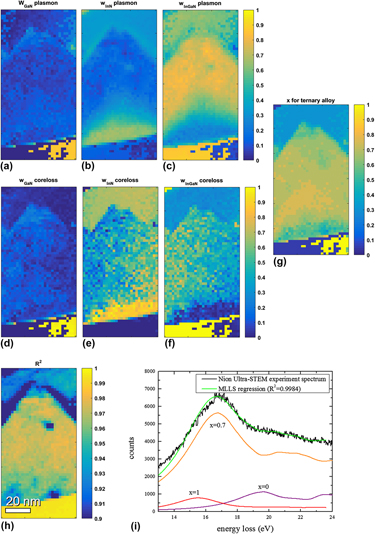Article contents
Study of phase separation in an InGaN alloy by electron energy loss spectroscopy in an aberration corrected monochromated scanning transmission electron microscope
Published online by Cambridge University Press: 08 December 2016
Abstract

Phase separation of InxGa1−xN into Ga-rich and In-rich regions has been studied by electron energy-loss spectroscopy (EELS) in a monochromated, aberration corrected scanning transmission electron microscope (STEM). We analyze the full spectral information contained in EELS of InGaN, combining for the first time studies of high-energy and low-energy ionization edges, plasmon, and valence losses. Elemental maps of the N K, In M4,5 and Ga L2,3 edges recorded by spectrum imaging at 100 kV reveal sub-nm fluctuations of the local indium content. The low energetic edges of Ga M4,5 and In N4,5 partially overlap with the plasmon peaks. Both have been fitted iteratively to a linear superimposition of reference spectra for GaN, InN, and InGaN, providing a direct measurement of phase separation at the nm-scale. Bandgap measurements are limited in real space by scattering delocalization rather than the electron beam size to ∼10 nm for small bandgaps, and their energetic accuracy by the method of fitting the onset of the joint density of states rather than energy resolution. For an In0.62Ga0.38N thin film we show that phase separation occurs on several length scales.
- Type
- Articles
- Information
- Journal of Materials Research , Volume 32 , Issue 5: Focus Issue: Aberration Corrected Transmission Electron Microscopy , 14 March 2017 , pp. 983 - 995
- Copyright
- Copyright © Materials Research Society 2016
Footnotes
Contributing Editor: Eric A. Stach
This author was an editor of this journal during the review and decision stage. For the JMR policy on review and publication of manuscripts authored by editors, please refer to http://www.mrs.org/editor-manuscripts/.
A previous error in this article has been corrected, see 10.1557/jmr.2017.245.
References
REFERENCES
A correction has been issued for this article:
- 13
- Cited by
Linked content
Please note a has been issued for this article.



